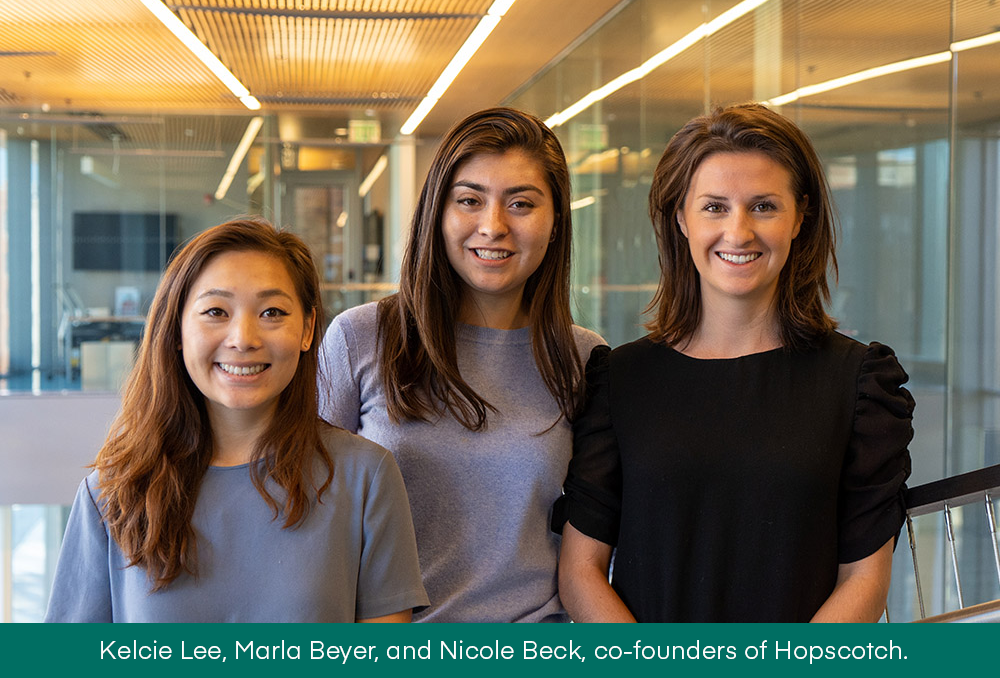From Business Classroom to Startup
What does it take to become a successful entrepreneur and a passionate changemaker? Of course, achieving either of these goals most often starts with a great idea. But if any new venture is to survive and grow over the long term, its founders also will need a solid foundation in business planning and strategic management.
How can business education help entrepreneurs see their ideas through from the planning stage to launch and beyond? We asked several graduates of Cornell University’s Johnson Graduate School of Management in Ithaca, New York, to share what it was like to build their own businesses while pursuing their MBAs. They also offer their best advice to help other entrepreneurs-in-the-making improve their chances of success.
Preparing for Entrepreneurship
During their one-year MBA program, Mike Kosnik and Samson Schirmer co-founded Enroute, a platform that helps improve patient care by enabling optimal intrahospital patient transportation. This aspect of healthcare has become especially important during the pandemic, when hospitals have been operating at or above capacity.
 Both entrepreneurs sought out graduate business education that suited their interest in technology, and they deliberately sought out a program with a heavy focus on entrepreneurship. In that environment, “everyone is constantly sharing ideas, looking for co-founders, and participating in events to help spur innovative thinking,” says Kosnik.
Both entrepreneurs sought out graduate business education that suited their interest in technology, and they deliberately sought out a program with a heavy focus on entrepreneurship. In that environment, “everyone is constantly sharing ideas, looking for co-founders, and participating in events to help spur innovative thinking,” says Kosnik.
The pair came up with the idea for Enroute while taking part in a business competition in Israel. For the competition, a hospital asked student teams to come up with ways to innovate healthcare. “The product idea we ended up pitching really resonated with the hospital,” says Kosnik. “We won the competition and a subsequent startup event in New York City that spring.”
Building a business from the ground up is never easy, says Schirmer. But he says his MBA education helped him develop the tools and mental frameworks necessary to operate in complex and challenging situations. It also exposed Schirmer and Kosnik to case studies that allowed them to learn from others’ past successes and failures as they built their own enterprise.
“When you know you’ve had all the training necessary to prepare you for these real-world scenarios, it definitely makes it easier,” says Schirmer. “You have the confidence to make a decision, be okay with it being wrong, and still find a way to work through it in the end.”
Learning to Overcome Obstacles
Will Mitchell and Nathanael “Nate” Koweda are the founders of Tangle, a virtual workspace that uses artificial intelligence to emulate the spontaneous interactions of physical workplaces. Mitchell and Koweda came to business school to better understand the obstacles they had encountered in their previous work experiences.
 Mitchell, for example, worked in corporate strategy and development for a large retailer where he was responsible for implementing technology to improve operations. He came to business school to learn how to overcome the barriers to technological adoption that he was encountering within his company.
Mitchell, for example, worked in corporate strategy and development for a large retailer where he was responsible for implementing technology to improve operations. He came to business school to learn how to overcome the barriers to technological adoption that he was encountering within his company.
“I found it difficult to overcome institutional inertia to adopt technology fast enough,” he says. “I knew that other companies did it well, so I looked to business school to teach me how technology could be developed and adopted.”
Koweda also came from a technical background. As a software engineer, he was on a team that worked for two years on a project that ultimately failed. Koweda wanted to know exactly what went wrong. “I realized that the engineering was not the issue and that the failure had to do with product market fit,” he says. He came to business school so that he could learn to better understand markets and the needs of consumers.
The pair chose a tech-focused MBA program that exposed them to “the holistic business environment that technology operates in,” says Koweda. “We learned to cheaply validate ideas and solutions, develop users, structure business models, work with multidisciplinary teams to accomplish a goal, understand investors, and also how to sell! We were able to put together a thoroughly reasoned plan to take to our initial investors.”
Exploring Ideas, Solving Problems
During her program, Marla Beyer, who graduated with her MBA in 2020, co-founded Hopscotch with her classmates Nicole Beck and Kelcie Lee. Hopscotch is a pediatric behavioral health platform offering a collection of interactive games and resources to help clinicians and hospitals better engage with their pediatric patients. The three partners used their time in the Cornell eLab Accelerator to interview more than 250 parents, children, clinicians, insurers, and benefit managers as they perfected their idea.

In a presentation for eLab’s Demo Day held in April 2020, the trio said that the inspiration for their product came from their discovery of a shortage of mental health support for children. By some estimates, they noted, “up to 85 percent of children aren’t getting the treatment and support they need.”
Beyer had seen the problem firsthand. Before enrolling in an MBA program, she worked in a children’s hospital where she saw parents struggling not only to cope with their children’s behavioral health conditions, but also to navigate a complex healthcare system. “Most of the individuals at the clinic had been waiting over six months to receive an initial consultation,” says Beyer. “Research shows that many of these conditions could have been prevented had these children received intervention at the appropriate time.”
Beyer, Beck, and Lee wanted to apply what they learned in their MBA programs to create a platform that teaches children to regulate their emotions, offers a community of support for parents, and helps providers coordinate care and track a child’s progress. They launched their company just as the pandemic quickly shifted pediatricians into offering virtual care. Hopscotch has since been accepted into the Harvard Innovation Lab spring accelerator program, which offers support to high-potential new ventures, and Launch NY, a nonprofit that offers free mentoring to founders.
“I viewed business school as a safe place to explore my entrepreneurial interests, away from professional obligations,” says Beyer. She adds that business school provided her with “the mental space and a robust set of academic, practical, and experiential opportunities to explore ideas.”
Appreciating the Benefits of Failure
Perhaps the biggest lesson that business programs offer to entrepreneurs is not just that it’s OK to fail, say Kosnik and Schirmer. Entrepreneurs also must learn that it’s necessary to fail if they want to succeed. “Setbacks and challenges are not easy for anyone, but they are especially difficult when they’re occurring almost daily on something that you’re dedicating yourself to fully,” says Schirmer. “Over time, we’ve learned to embrace them and have them motivate us to drive forward. It’s important to prepare for this and to be excited for the challenges ahead, instead of living in fear of them.”
 Mitchell and Koweda add that students should view business school as “a safe space to take risks” and a place where “any idea can be tested out.” It also helps that every classmate is a potential co-founder, while professors and alumni are there to provide mentorship and support, Mitchell adds. “We started sharing ideas the first week of school, discussing them with our professors and classmates. What became Tangle was one of the first ideas we had during the summer of 2019.”
Mitchell and Koweda add that students should view business school as “a safe space to take risks” and a place where “any idea can be tested out.” It also helps that every classmate is a potential co-founder, while professors and alumni are there to provide mentorship and support, Mitchell adds. “We started sharing ideas the first week of school, discussing them with our professors and classmates. What became Tangle was one of the first ideas we had during the summer of 2019.”
Putting together the right team is also crucial, say Mitchell and Koweda. They turned to expert advisors with knowledge in healthcare technology, operations, and software engineering. “Any investor would say the No. 1 reason startups fail is related to a team issue,” Koweda says. “It's crucial to have a tight team that shares the same vision and has a willingness to sacrifice and push each other,” but also enjoy the journey.
The message they’d like to leave for aspiring founders is that entrepreneurship is simultaneously challenging and rewarding. “It’s a great way to apply all the lessons learned in the business school classroom. It’s a perfect continuation to business education,” says Mitchell. Launching a startup “takes a village,” he adds. “We're almost custodians of the idea that is Tangle, rather than owners in the strictest sense.”
Making the Leap Into Entrepreneurship
Beyer of Hopscotch echoes Mitchell’s sentiment that “it takes a village” to create a successful startup. She and her co-founders are grateful for their access to a network that helped them find advisors in technology, pediatrics, child and adolescent psychiatry, and health insurance.
 For that reason, she advises prospective business students interested in entrepreneurship to do their research before they start any program. “Explore in depth the entrepreneurial related resources and opportunities offered, so that once you arrive on campus you can begin taking immediate advantage and hit the ground running,” she says.
For that reason, she advises prospective business students interested in entrepreneurship to do their research before they start any program. “Explore in depth the entrepreneurial related resources and opportunities offered, so that once you arrive on campus you can begin taking immediate advantage and hit the ground running,” she says.
Beyer also recommends that students expand their search beyond the business school, because resources are often available campuswide. “If there are incubator programs you could potentially be a part of, connect with the individuals who run those programs early on so you can learn how to best position yourself to take part.”
What about people who aren’t sure that entrepreneurship is right for them? That was the case for Mike Annunziata, who graduated with his MBA in 2017. Annunziata founded Farther Farms, a company that has developed a process of preserving food without need for refrigeration or freezing. Its objective is to reduce food waste throughout the global food chain.
After working several years as a venture capitalist, Annunziata saw business school as a chance “to experiment, fail, and ultimately learn the craft of entrepreneurship,” all with the help of faculty and professional mentors.
In the process, Annunziata says that he learned that it takes a “ruthless focus and customer-centricity” to be a successful startup founder. “Business education teaches founders how to make reasoned decisions and allocate risks. As a business grows, those decisions become more and more impactful,” he adds. “Without a sound framework in how to make difficult decisions in uncertain environments, it's very difficult to be successful in business.”
 Perhaps the biggest lesson, Annunziata says he learned? That entrepreneurship is hard, and nothing is guaranteed. But he emphasizes that these realities are also part of the excitement and reward of staring one’s own business. “Shifting from a scarcity mindset to an abundance mindset is critical to success on the entrepreneurial path. Focusing on how one can create value for others becomes essential,” says Annunziata.
Perhaps the biggest lesson, Annunziata says he learned? That entrepreneurship is hard, and nothing is guaranteed. But he emphasizes that these realities are also part of the excitement and reward of staring one’s own business. “Shifting from a scarcity mindset to an abundance mindset is critical to success on the entrepreneurial path. Focusing on how one can create value for others becomes essential,” says Annunziata.
“Competition in business is inevitable, but we can overcome doubt inside ourselves to take the leap into entrepreneurship,” he adds. “Your courage will be tested, but the rewards of this path can be large.”






